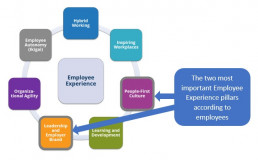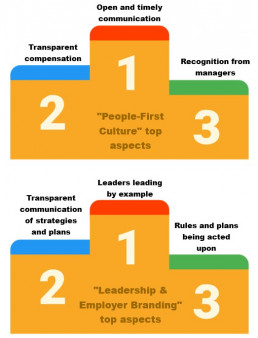In March 2022, IDC asked 885 European employees that had confessed to be looking for alternative employment about their motivation for doing so. The top reason was, unsurprisingly, better pay. What was more interesting was that “better working environment (i.e., a better employee experience)” was almost as high among the reasons for job change. It showed that today, work is less about paying the bills and advancing a career. It is much about personal development and fulfillment, as well as being a social and collaborative experience.
One year later, in March 2023, similar questions to 790 employees that were looking for a new job. The proportion of employees citing “better work environment / better corporate culture” was 48%, up from 42% the year before, and just 1% point behind “better pay”. So, not only are the ‘soft’ values important to employees, but they are becoming more and more important. Inflation could also play a role in this detachment from the “hard work” paradigm (i.e. hard as working hard to reach higher levels in the company / higher level of salary). The price increases undermined salaries and dream of the salary-based buying power that we saw previously.
Is it become the strenuous, ‘blue collar’ jobs are disappearing while ‘white collar’, knowledge worker jobs are taking over? The data does not support this hypothesis. All workers, regardless of whether they are desk workers or store/factory/field workers have “better pay” as the #1 motivation to look for a new job. Also, all workers have “better work environment / better corporate culture” as a key motivation for looking for a new job. Knowledge or desk workers are relatively interested in a better corporate culture, while store/factory/field workers are relatively interested in better teams / change of colleagues. Instead, it looks like all work types are becoming more knowledge intensive and bigger part of the individual identify, which prompts all employees to place higher value on work environment, culture, leadership, etc., as opposed to pay.
Dissecting “Employee Experience” to Understand Employee Work Motivation
In the March 2022 European employee survey, we also set out to understand which aspects of “employee experience” were more important to employees. We defined seven fundamental aspects of employee experience and asked the employees to rate these in terms of importance. We discovered that relatively ‘soft’ aspects of work, namely corporate culture and leadership & employer brand, were the most important factors of the seven, and more important for employees than we previously assumed.
In the March 2023 European employee survey, we wanted to deep dive into the work culture and leadership aspects of the employee experience. In other words, we wanted to find out what was behind the emphasis on these topics among European employees. Again, we asked employees to rate the importance of a number of subtopics underneath work culture and leadership.
The result showed a remarkable drive amongst the employees for purpose in their work, for a sense of meaningful contribution, for personal development and for fairness. This applied to all types of workers, from desk workers over field workers to staff in stores/warehouses/factories. This drive for purpose implies a number of employee requirements around open communication, leadership integrity, fairness in recognition and compensation, etc. And these requirements are indeed reflected in the top aspects of the two pillars under investigation, work culture and leadership, respectively, as shown in the figures below.
General Implications for Organizations: New Leadership Styles Are Called For
Gone are the days of secluded top managers running organizations in separation from the myriad of employees carrying out instructions and work. Most management experts might comment that this ‘new’ style of open, visionary, and inclusive leadership have been practices for decades already. However, the results of both the 2022 and 2023 surveys suggest that most European organizations still have far to go. The survey data showed that the two most important employee experience pillars, “People-First Culture” and “Leadership and Employer Branding”, were also the two pillars with the largest gap between importance and employee’s rating of their current employer. In other words, the two pillars of the highest level of disappointment with the current employer.
The survey data also showed that for the detailed aspects of these two employee experience pillars, the most important aspects were also the aspects with the largest improvement potential. “Open and timely communication” sounds easy but is often very difficult to carry out successfully in practice. Among the general implications for organizations are:
- Leadership development, especially in the area of soft skills, is critical.
- Executive search must place higher emphasis on aspects such as empathy, integrity, and communication skills.
- Enhancing work culture and leadership communication are new strategic areas where HR can make a difference for organizations.
Implications for HCM Software Vendors: New Solution Types Will See High Demand
Software solutions also have a role to play in remediation of the current culture and leadership shortcomings. In many cases, new HCM solutions will be needed to improve processes related to communication, recognition, compensation, and recruiting. We see particular opportunities in the areas below:
- Compensation management
- Management development training
- Pay gap and Environmental, Social & Governance (ESG) analytics
- Employee engagement & rewards
- Employee performance management
- Recruiting solutions & applicant tracking solutions
Please see the following IDC studies (behind paywall) for more information:
- Building Blocks of a Better Employee Experience (August 2023)
- A Deep Dive into People-First Culture: Results from IDC’s March 2023 European Future of Work Survey (July 2023)
- Hybrid Working in Europe: A Deep Dive into IDC’s Hybrid Working EX Pillar and What European Employees Are Saying About It (September 2022)



